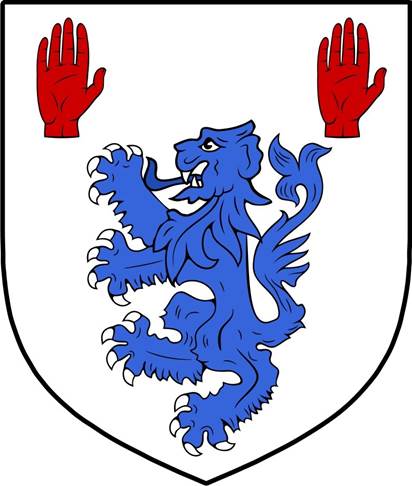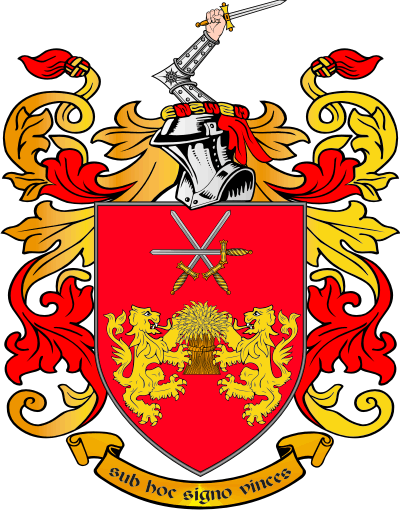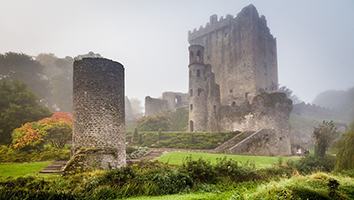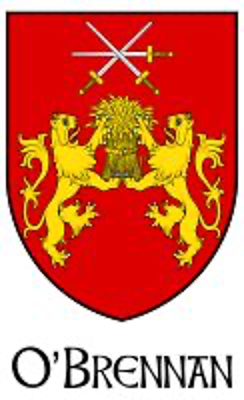https://en.wikipedia.org/wiki/Brennan_(surname)
O’Brennan is one of the most frequent surnames in Ireland. It derives from the two Irish originals O’Braonain and Mac Branain.
The name Braonan is generally interpreted as meaning sorrowful, although some might wonder whether a king of the Vikings was more likely to name his son after Braon, the Celtic god of war. Another meaning of the word is raven, “one who delights in battle.”
The ancestors of the Brennan family are thought to have arrived in Ireland in the 5th century B.C. and settled in northern Kilkenny, shortly after the time of Christ.
The Mac Branain were chiefs of a large territory in the east of the present County Roscommon and the majority of the Brennans of north Connacht, counties Mayo, Sligo and Roscommon, descend from them.

O’Braonain originated in at least four distinct areas: Kilkenny, East Galway, Westmeath and Kerry.

Of these the most powerful were the O’Braonain of Kilkenny, chiefs of Idough in the north of the country.
The Normans invaded Idough in north Kilkenny in the 1100s and subsequently settled there, driving many of the Brennans into the hills. The family was practically independent, but technically subservient to the Normans. After they lost their land to the English, many of them became notorious as leaders of the outlaw bands.
The Brennan Clan came into existence over a thousand years ago when Braonan, the son of Cearbhall, Viking King of Dublin, settled in the area of north Kilkenny, then known as Idough.
Until the coming of the Normans in the 12th century the Brennans were the most powerful clan in the area, having defeated all local opposition. After half a century of battles with the Normans, the Brennans in 1359 signed a military alliance with the ‘Old English’ (Catholic) Hiberno-Norman Butler family, the Earls of Ormond. This allowed them to hold on to their lands through a tumultuous period of Irish history, despite periodic land disputes.
In the 17th century the Brennan lands were granted to an English Protestant, Christopher Wandesforde, and the Brennans lost all legal rights to their land. The Brennans responded by burning houses, levelling ditches and destroying crops.
The clan also took part in the rebellion of 1641, besieging a castle at Castlecomer filled with English Protestants and ultimately driving them from Idough. During peace negotiations, a decision was ‘delayed’ on legally returning Idough to the Brennans. Before it could be resolved, English King Charles I was killed by his own English Parliament, and Oliver Cromwell devastated Ireland.
The Brennans continued to occupy their land ‘illegally’, giving way to the following recorded statements in relation to the question of returning lands to the clan:
“The O’Brennan septs are and always have been mere Irish who illegally entered and intruded into the territory of Idough, anciently called ‘O’Brennans’ country,’ holding its several lands and tenancies by a strong hand against all claims.”
— English jury, 1635
“…The O’Brennans, a sept of thieves without any right or title, … were a perpetual disturbance to the peace of the county,” English officials arguing in 1644 against the official return of the Brennan lands.
In the 1650s, with Ireland becoming anglicized, the O’Brennans started to become the Brennans.
After English King Charles II failed to restore the Brennan lands, some of them become outlaws around 1680. They were the most famous bandits in Ireland. Among other things, they burglarized Kilkenny Castle.
After losing a court battle, and after 25 Brennans were outlawed for fighting the forces of Protestant ‘William of Orange’ (English King William III’) on behalf of the ‘Jacobites’ (followers of Catholic King James II), in 1695 the Brennans found themselves with no legal claims to their ancestral lands. They remained on their ancestral lands as tenants!
In an 1890 census, the name Brennan was found to be the 28th most common surname in Ireland.
It seems there is not an active clan organisation for your name, at this time.
However, the revival of interest in Irish culture and heritage over the past 100 years has led to the revival of many Irish Clans. In more recent times, increased access to historical archives online, DNA testing and ease of travel to Ireland has led many individuals to explore their own genealogy and connections to Irish Clans. Some of these have gone on to establish Clan Associations in Ireland, the USA, the UK, Canada, Australia, New Zealand and anywhere that the Irish Diaspora has found itself.
Clans of Ireland Ltd invite those interested in Irish Clans to contact them with a view to explore the possibility of reviving your Irish Clan.

